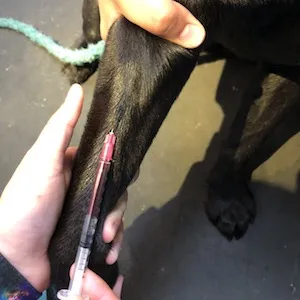Heartworm disease is a severe and potentially fatal condition that affects dogs in the United States and globally. Caused by foot-long worms residing in the heart, lungs, and associated blood vessels, it can lead to severe lung disease, heart failure, and damage to other vital organs. As a natural host for heartworms, dogs can harbor hundreds of these parasites if left untreated, causing lasting damage. Fortunately, effective Heartworm Meds For Dogs are available for both prevention and treatment, offering a crucial line of defense against this debilitating disease. Understanding these medications and their proper use is paramount for every dog owner.
What is Heartworm Disease in Dogs?
Heartworm disease is a progressive illness that significantly impacts a dog’s health and quality of life. The dog is the definitive host, meaning heartworms mature into adults, mate, and reproduce within their bodies. If an infection goes unchecked, the number of worms can escalate, leading to profound damage to the heart, lungs, and arteries. The effects of the disease can linger long after the parasites are gone, underscoring the importance of early detection and intervention.
 Microscopic wormsMicrofilaria, the microscopic baby worms produced by adult heartworms, circulate in the bloodstream of an infected dog.
Microscopic wormsMicrofilaria, the microscopic baby worms produced by adult heartworms, circulate in the bloodstream of an infected dog.
The Crucial Role of Heartworm Prevention for Dogs
Prevention is undeniably the best strategy against heartworm disease. Heartworm meds for dogs designed for prevention work by eliminating the immature (larval) stages of the parasite, preventing them from developing into harmful adult worms. This is critical because larvae can molt into a juvenile/immature adult stage in as little as 51 days, which preventives cannot effectively eliminate.
Preventive medications are available in various forms, including monthly oral pills, topical spot-on applications, and even long-acting injections that can last for 6 or 12 months. The consistent and timely administration of these preventives is vital to ensure continuous protection. Missing even a single dose or administering it late can leave your dog vulnerable to infection. Puppies under 7 months of age can typically start on heartworm prevention without an initial test, as it takes at least six months for a dog to test positive after infection. However, follow-up testing is crucial. For information on protecting your dog from various parasites, you might be interested in finding affordable flea and tick prevention for dogs.
Heartworm Testing: A Key Step Before Medication
Given that heartworm disease can present with few to no symptoms in its early stages, regular heartworm testing is indispensable for early detection. The American Heartworm Society (AHS) recommends annual testing for all dogs. This routine screening usually involves a small blood sample, which veterinarians use to detect the presence of heartworm proteins.
 Dog getting blood drawnA small blood sample is all that’s needed for a heartworm test, which can be done during a routine veterinary visit.
Dog getting blood drawnA small blood sample is all that’s needed for a heartworm test, which can be done during a routine veterinary visit.
For adult dogs over seven months old who haven’t been on a preventive, a heartworm test is required before starting medication. If the test is negative, prevention can begin, followed by retesting at 6 and 12 months, and then annually. Annual testing is necessary even for dogs on year-round prevention, as preventives are highly effective but not 100% foolproof, and factors like missed doses or expelled medication can compromise protection.
What to Expect if Your Dog Tests Positive for Heartworms (Treatment Medications)
While a positive heartworm diagnosis can be distressing, the good news is that most infected dogs can be successfully treated. The primary goal of treatment is to stabilize the dog, eliminate all adult and immature worms, and minimize side effects.
Confirmation and Initial Steps
Once an initial antigen test yields a positive result, your veterinarian will typically confirm the diagnosis with a different test. This is essential because the treatment regimen is complex and costly. Following confirmation, strict exercise restriction is paramount. Physical exertion significantly increases the rate at which heartworms damage the heart and lungs, so activity levels must be curtailed immediately. In severe cases, or if other health issues are present, stabilization with appropriate therapy may be required before starting specific heartworm treatment, a process that could take several months.
Administering Treatment: Melarsomine and Adjunctive Therapies
The only FDA-approved drug for treating adult heartworm infections in dogs is melarsomine, which is administered via injections in a veterinary hospital. While there are risks associated with its use, most adult worms die quickly and are eliminated within one to three months. Strict cage rest and significantly restricted exercise during this period are crucial to minimize complications from treatment.
The AHS treatment protocol often includes several other medications to enhance success and reduce side effects. This typically involves administering a heartworm preventive medication to the infected dog for two months prior to melarsomine treatment. This helps prevent new infections while the existing ones are being addressed and reduces the population of microfilariae (baby worms), which can cause reactions to preventives. Long-term, continuous use of heartworm preventives alone is not recommended as a substitute for melarsomine because adult heartworms continue to cause damage to the heart and lungs as long as they are present. For a comprehensive approach to parasite control, exploring options like best dog wormer flea and tick treatment can be beneficial. Additionally, if you are looking for convenient options, chewable flea and tick treatment for dogs are popular choices.
 Dog recovering in a cageRestricting exercise is a critical part of heartworm treatment to prevent further damage.
Dog recovering in a cageRestricting exercise is a critical part of heartworm treatment to prevent further damage.
Approximately nine months after the treatment is completed, another heartworm test will be performed to confirm the elimination of all heartworms. To prevent reinfection, year-round heartworm prevention should be maintained for the remainder of your dog’s life. If your dog still tests positive four months post-treatment, further re-evaluation and potentially a second course of treatment may be necessary, as it can take longer for the antigen to clear, or a single course may not have eliminated all worms.
Prescription Requirements for Heartworm Medications
Yes, a prescription from a licensed veterinarian is required for heartworm preventives in the U.S. The FDA mandates this to ensure proper usage and animal safety. Before prescribing, veterinarians typically conduct a heartworm test to confirm your pet isn’t already infected. Administering preventives to an infected dog can lead to rare but severe reactions. This initial testing is crucial, though not necessary for very young puppies who haven’t had enough time for heartworms to mature. If you are seeking medication for specific breeds, you might find articles on best flea and tick medicine for german shepherd helpful.
Beyond Heartworms: Additional Protection from Medications
Many of today’s heartworm preventives offer broader protection against various internal and external parasites. Depending on the specific product, these heartworm meds for dogs can also be effective against intestinal parasites like hookworms, roundworms, whipworms, and tapeworms. Some even provide protection against external parasites such as fleas, ticks, ear mites, and the mites that cause scabies. It’s important to consult your veterinarian to determine the most suitable product for your pet’s comprehensive parasite control needs, as no single product covers all parasites. For example, specific medications are available as flea and tick medicine for great danes.
Heartworm Risk Factors and Year-Round Prevention
Heartworm disease has been diagnosed in all 50 states of the U.S., and risk factors are unpredictable. Factors like climate variations, the presence of wildlife carriers (coyotes, foxes, wolves), and mosquito breeding areas contribute to varying infection rates. Even pets that reside indoors are at risk, as infected mosquitoes can enter homes. The AHS strongly advocates for year-round prevention, regardless of geographical location or perceived risk. This “Think 12” approach means testing your pet every 12 months and administering heartworm preventive 12 months a year. This recommendation holds true even in northern states with cold winters or desert regions with seemingly few mosquitoes, as micro-climates and the adaptability of mosquito species can still pose a threat.
Important Considerations for Heartworm Medication
Missed Doses and Expired Medication
If you miss a dose of your dog’s heartworm preventive, or if the medication’s expiration date has passed, it is crucial to consult your veterinarian immediately. For missed doses, your vet will likely recommend restarting the preventive and retesting your dog six months later to ensure no infection has developed. Using expired medication is not advised, as its effectiveness and safety cannot be guaranteed.
Natural Prevention and Vaccines
Currently, there is no commercially available vaccine for heartworm disease. Prevention relies solely on the regular and appropriate use of prescription preventive medications. Similarly, only heartworm prevention products that are tested and proven effective by the U.S. Food and Drug Administration (FDA) should be used, meaning there is no effective natural prevention for heartworm disease.
What Causes a Dog to Die from Heartworm Disease?
Heartworm disease is complex and can impact numerous vital organs, including the heart, lungs, kidneys, and liver. Adult worms cause inflammation of blood vessels and can lead to blockages, resulting in pulmonary thrombosis (blood clots in the lungs) and heart failure. The extensive damage caused by these foot-long parasites can also lead to liver or kidney failure. A large number of infective larvae acquired at once can even lead to sudden death due to an overwhelming attack on the vascular system. The outcome varies significantly depending on the individual patient, the severity of the infection, and other health factors. Older dogs with long-term infections may have pre-existing damage that complicates treatment success.
Conclusion
Heartworm disease is a serious threat to our canine companions, but with proper awareness and consistent action, it is highly preventable and treatable. Understanding the role of heartworm meds for dogs, both for year-round prevention and as part of a comprehensive treatment plan, is essential for every responsible pet owner. Regular veterinary check-ups, annual heartworm testing, and strict adherence to your veterinarian’s recommendations are the cornerstones of protecting your dog’s health and ensuring a long, happy life free from heartworm disease. Always consult your veterinarian to determine the best prevention and treatment strategies tailored to your dog’s specific needs.
